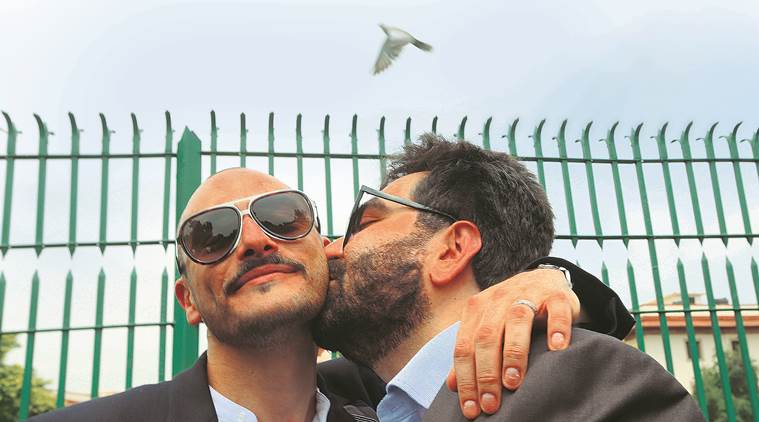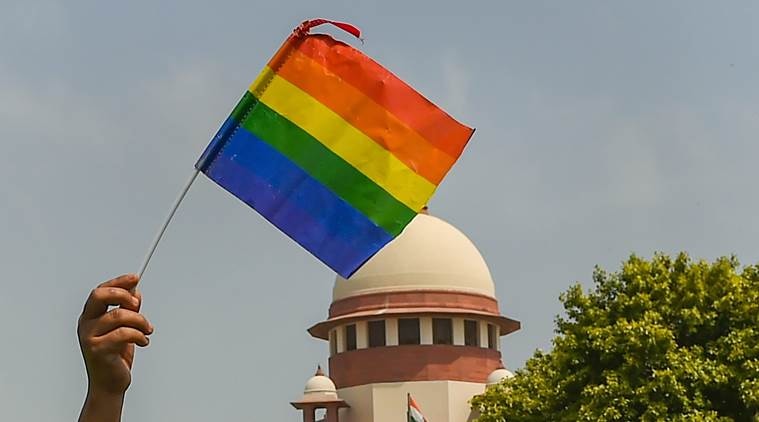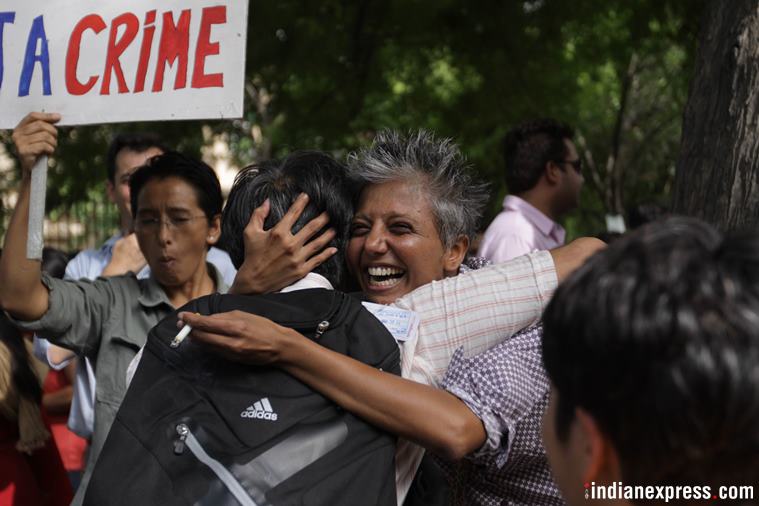 One of the petitioners in the case, Keshav Suri (right), and his partner Cyril Feuillebois celebrate the Supreme Court verdict reading down the 158-year-old Section 377 that held same-sex relations unnatural and, therefore, criminal. Neeraj Priyadarshi
One of the petitioners in the case, Keshav Suri (right), and his partner Cyril Feuillebois celebrate the Supreme Court verdict reading down the 158-year-old Section 377 that held same-sex relations unnatural and, therefore, criminal. Neeraj Priyadarshi
From today, consensual gay sex between adults in private is no longer a crime in India.
Delivering a historic judgment Thursday which underlined the supremacy of “constitutional morality” over “societal morality”, the Supreme Court, in one stroke, scrapped a 158-year-old British-era law that banned same-sex relations between consenting adults in private and punished them with jail terms for life or up to ten years.
A five-judge Constitution Bench, comprising Chief Justice of India Dipak Misra, Justices R F Nariman, A M Khanwilkar, D Y Chandrachud and Indu Malhotra, in four separate but concurring orders on a clutch of petitions, decriminalised a part of Section 377 of the Indian Penal Code, saying it violated the identity of an individual, the right to equality and the right to privacy — the provision will, however, continue to apply to cases of bestiality, carnal intercourse with minors and in cases of no consent.
Triggering celebrations among members of the LGBTQ (lesbian, gay, bisexual, transgender, queer) community, the Bench overturned a 2013 ruling of the Supreme Court that had reinstated gay sex as a criminal offence after four years of decriminalisation following a Delhi High Court order.
Express Editorial | The long road to equality
Justice Malhotra said “history owes an apology to the members of this community and their families for the delay in providing redressal for the ignominy and ostracism that they have suffered through the centuries”.
The Centre, deciding not to contest the petitions challenging Section 377, had left the decision to the “wisdom” of the Supreme Court. It did, however, ask the court not to go into other issues like gay marriages, adoption and ancillary civil rights of the LGBTQ community.
The judgment only dealt with decriminalisation of the provision, and did not go into into the issue of same-sex marriage but Justice Chandrachud did note it “calls for the state to recognise rights which bring true fulfilment to same-sex relationships”.
CJI Misra, writing for himself and Justice Khanwilkar, said: “When we say union, we do not mean the union of marriage, though marriage is a union. As a concept, union also means companionship in every sense of the word, be it physical, mental, sexual or emotional. The LGBT community is seeking realisation of its basic right to companionship, so long as such a companionship is consensual, free from the vice of deceit, force, coercion and does not result in violation of the fundamental rights of others.”
 The judgment only dealt with decriminalisation of the provision, and did not go into into the issue of same-sex marriage (PTI)
The judgment only dealt with decriminalisation of the provision, and did not go into into the issue of same-sex marriage (PTI)
But Justice Chandrachud, while discussing American case laws allowing gay marriages, said that in the 2015 case of Obergefell vs Hodges, the US Supreme Court, by a 5-4 majority, ruled that the fundamental right to marry is guaranteed to same-sex couples by the Due Process Clause and the Equal Protection Clause of the Fourteenth Amendment to the US Constitution.
Stating that “decriminalisation” was “necessary to bury the ghosts of morality which flourished in a radically different age and time”, he observed that “decriminalisation is a first step”. He said “sexual orientation implicates negative and positive obligations on the state. It not only requires the state not to discriminate, but also calls for the state to recognise rights which bring true fulfilment to same-sex relationships”.
CJI Misra and Justice Khanwilkar, while underlining that Section 377 “fails to make a distinction between non-consensual and consensual sexual acts of competent adults in private space which are neither harmful nor contagious to society”, said the provision “subjects the LGBT community to societal pariah and dereliction and… has become an odious weapon for the harassment of the LGBT community by subjecting them to discrimination and unequal treatment”.
To make their point, the CJI recalled the words of poet-writer Johann Wolfgang von Goethe: “I am what I am, so take me as I am.”
The two judges said “the role of the Court assumes further importance when the class or community whose rights are in question are those who have been the object of humiliation, discrimination, separation and violence by not only the State and the society at large but also at the hands of their very own family members. The development of law cannot be a mute spectator to the struggle for the realisation and attainment of the rights of such members of the society”.
 Celebrating the Supreme Court’s verdict on Section 377, in New Delhi on Thursday. Tashi Tobgyal
Celebrating the Supreme Court’s verdict on Section 377, in New Delhi on Thursday. Tashi Tobgyal
All five judges explained how the 2014 decision in the National Legal Services Authority vs Union of India matter, which recognised transgenders as the third gender, and the 2017 verdict in the Puttaswamy case, upholding privacy as a fundamental right, had influenced the development of jurisprudence against Section 377.
On the importance of Constitutional morality, the CJI and Justice Khanwilkar said: “It is the concept of constitutional morality which strives and urges the organs of the State to maintain such a heterogeneous fibre in the society, not just in the limited sense, but also in multifarious ways. It is the responsibility of all the three organs of the State to curb any propensity or proclivity of popular sentiment or majoritarianism. Any attempt to push and shove a homogeneous, uniform, consistent and a standardised philosophy throughout the society would violate the principle of constitutional morality. Devotion and fidelity to constitutional morality must not be equated with the popular sentiment prevalent at a particular point of time.”
Echoing the view, Justice Chandrachud too said “under our constitutional scheme, no minority group must suffer deprivation of a constitutional right because they do not adhere to the majoritarian way of life”.
Justice Nariman highlighted that Parliament too was “alive to privacy interests and the fact that persons of the same-sex who cohabit with each other are entitled to equal treatment”. Elaborating, he pointed to the definition of mental illness in the 2017 Mental Healthcare Act, 2017 and said it “throws to the winds all earlier misconceptions of mental illness including the fact that same-sex couples who indulge in anal sex are persons with mental illness”. He rejected arguments that the matter should be left to Parliament and the court should not take upon itself the guardianship of changing societal mores.
 Members of the LGBT community celebrate following the Supreme Court’s verdict on Section 377 in Mumbai on Thursday. (Express photo/Nirmal Harindran)
Members of the LGBT community celebrate following the Supreme Court’s verdict on Section 377 in Mumbai on Thursday. (Express photo/Nirmal Harindran)
“Such an argument must be emphatically rejected. The very purpose of the fundamental rights chapter in the Constitution of India is to withdraw the subject of liberty and dignity of the individual and place such subject beyond the reach of majoritarian governments so that constitutional morality can be applied by this Court to give effect to the rights, among others, of ‘discrete and insular’ minorities… These fundamental rights do not depend upon the outcome of elections. And, it is not left to majoritarian governments to prescribe what shall be orthodox in matters concerning social morality,” Justice Nariman said.
Express Opinion | A Victory, A New Battle
Justice Chandrachud, who called Section 377 an “antiquated and anachronistic colonial-era law”, sought to know “what is ‘natural’ and what is ‘unnatural’?… And who decides the categorisation into these two ostensibly distinct and water-tight compartments? Do we allow the state to draw the boundaries between permissible and impermissible intimacies between consenting adults?”.
He pointed out that “homosexuality has been documented in almost 1500 species” who “unfortunately are not blessed with rational capabilities (and the propensity to ‘nurture’ same sex thoughts) as are found in mankind”.
 To make their point, the CJI recalled the words of poet-writer Johann Wolfgang von Goethe: “I am what I am, so take me as I am.” (Express Photograph by Tashi Tobgyal)
To make their point, the CJI recalled the words of poet-writer Johann Wolfgang von Goethe: “I am what I am, so take me as I am.” (Express Photograph by Tashi Tobgyal)
“The operation of Section 377 denies consenting adults the full realization of their right to health, as well as their sexual rights. It forces consensual sex between adults into a realm of fear and shame, as persons who engage in anal and oral intercourse risk criminal sanctions if they seek health advice. This lowers the standard of health enjoyed by them and particularly by members of sexual and gender minorities, in relation to the rest of society,” he said.
It also has a “significant detrimental impact on the right to health of those persons who are susceptible to contracting HIV — men who have sex with men (MSM) and transgender persons,” Justice Chandrachud said, warning that “the silence and secrecy that accompanies institutional discrimination may foster conditions which encourage escalation of the incidence of HIV/AIDS”.
Justice Malhotra underlined that the consent in Section 377 “must be free consent, which is completely voluntary in nature, and devoid of any duress or coercion”. She said that the reading down “shall not, however, lead to the re-opening of any concluded prosecutions, but can certainly be relied upon in all pending matters whether they are at the trial, appellate, or revisional stages”.
During the hearing, Justice D Y Chandrachud quoted the lyrics from Leonard Cohen’s 1992 song ‘Democracy’. “Democracy…It’s coming through a hole in the air… It’s coming from the feel that this ain’t exactly real, or it’s real, but it ain’t exactly there. From the wars against disorder, from the sirens night and day, from the fires of the homeless, from the ashes of the gay: Democracy is coming…”